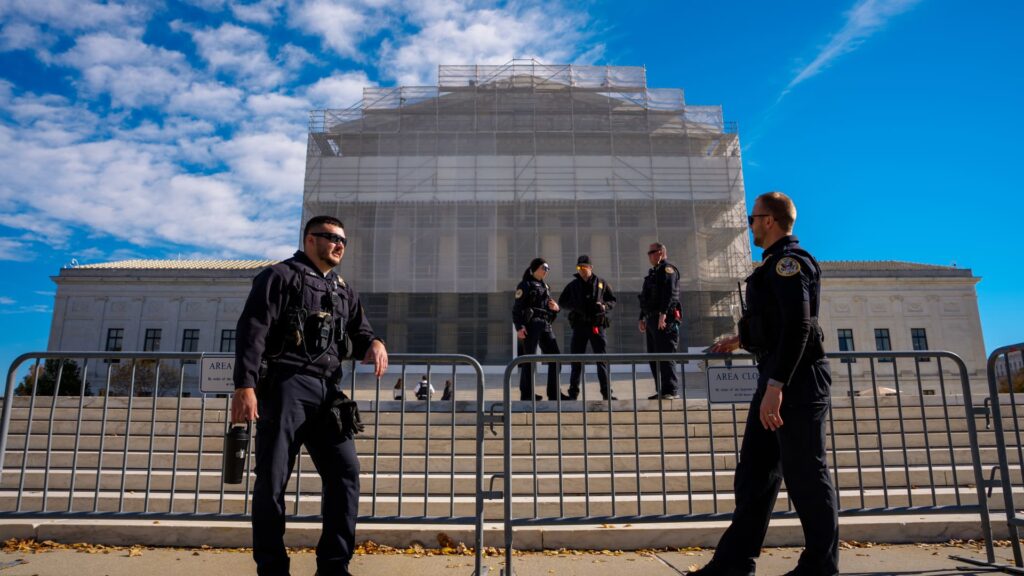Police officers stand guard outside the Supreme Court on November 5, 2025 in Washington, DC.
Andrew Harnik | Getty Images
The Trump administration told the Supreme Court on Monday morning that it still wants a block on a Rhode Island federal judge’s order mandating that it pay 42 million Americans their full SNAP benefits for November.
The message came a day after the 1st Circuit U.S. Court of Appeals in Boston, for a second time, flatly rejected a request by the Trump administration to stay that order pending its full appeal of the decision.
That judge’s order remains temporarily paused as a result of a prior ruling by Supreme Court Justice Ketanji Brown Jackson.
But Jackson on Monday told the Trump administration to inform the Supreme Court by 11 a.m. ET whether it intends to continue to seek a stay of the order.
The administration quickly did so, and said it would comply with her directive to file a supplemental brief on the request by 4 p.m. Monday.
Plaintiffs in the case were told to respond by 8 a.m. on Tuesday.
Separately on Monday, a federal judge in Massachusetts issued an order blocking the Trump administration’s memo over the weekend telling states that they had to “undo” any full SNAP benefits payments to recipients, or face financial penalties.
The ruling Sunday night by a three-judge panel of the 1st Circuit Court of Appeals came a day after the U.S. Department of Agriculture issued that memo.
And it came hours after the Senate narrowly passed the first step of a bipartisan deal that might reopen the government within days, and fully fund the Supplemental Nutrition Assistance Program through next September.
“In reviewing the district court’s balancing of the equities, we also cannot ignore the particular events preceding this litigation,” wrote Circuit Court Judge Julie Rikelman in the panel’s decision Sunday. “As the district court found, ‘this is a problem that could have been avoided.'”
“The record here shows that the government sat on its hands for nearly a month, unprepared to make partial payments, while people who rely on SNAP received no benefits a week into November and counting,” Rikelman wrote.
“In light of these unique facts, we cannot conclude that the district court abused its discretion in requiring full payment of November SNAP benefits to effectuate the October 31 [temporary restraining order] after the government had failed to comply with it.”
The Trump administration on Oct. 24 broke decades of precedent when it said it would not pay SNAP benefits in November because Congress had not appropriated money for the program, or any other government program, past the date the shutdown began, Oct. 1. Past administrations had paid SNAP benefits in full during other shutdowns.
The administration rejected the idea of using the remaining $4.6 billion in a contingency fund that Congress had specifically allocated to backstop SNAP.
A group of plaintiffs, comprised of nonprofits, local governments, a union and a food retailer, sued the administration in U.S. District Court in Rhode Island seeking a judicial order forcing the administration to use the contingency fund and other pools of money to fully fund SNAP benefits.
Judge Jack McConnell, who is overseeing the case, ordered the administration to make at least partial benefits as soon as possible by tapping the contingency fund, and to investigate if other money could be used.
McConnell on Thursday ordered that the administration pay full benefits, days after the administration told him it would pay only partial benefits — but that it would take some time to do so — and told him that it had ruled out using so-called Section 32 funds.
McConnell ordered that the administration use Section 32 funds to make up the difference between the 65% of benefits the administration planned to pay by using the contingency fund and the full value of the benefits. SNAP benefits cost about $8 billion each month.
The administration then asked the 1st Circuit for a temporary stay of McConnell’s order on an emergency basis, which the appeals court rejected Friday.
But the appeals court at the same time also said it was still considering the “government’s motion for a stay pending appeal [of McConnell’s order] … and we intend to issue a decision on that motion as quickly as possible.”
On Friday night, Jackson, acting on a request by the administration, paused McConnell’s order from taking effect and told the 1st Circuit to quickly rule on the request for the stay pending appeal.
Jackson’s order paused for 48 hours any ruling by the 1st Circuit from taking effect.

